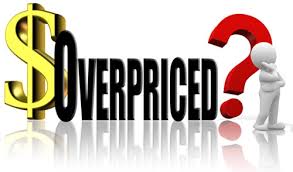Avoid Mistakes Pricing Your Home
How do you avoid selling your house for less than it is worth? How do you avoid losing money in your sale? The first thing that you need to do is find out what other people have done wrong.
Find out where others made a mistake and lost money as a result.
Then avoid making that same mistake yourself.
I’m going to go through a few mistakes and show you what they are. I’ll show you what the home seller did wrong that caused their home to sell for less than their neighbor’s home.
Underpricing is the easiest way to lose money on your home sale.
The number one reason people lose money on their home sale is underpricing. They think their home is worth X. They don’t research the value. That is why it is so critical you have a true understanding of the value of your home in today’s market.
They put their home on the market, sell it for less than it’s worth, and never realize their mistake.
A perfect example is the sellers who sold 3 acres
– that was worth about $300,000 – for $80,000.
- They lived about 30 miles away and didn’t realize the development potential the property had.
- They hired an agent who wasn’t familiar with the area.
- Their agent didn’t realize the development potential.
Their buyer had experience with developments. He researched the zoning and discovered the 3 acres was zoned for high-density condos.
The sellers didn’t know the property was zoned for high density condos. They didn’t know the county was planning on putting in a new road right past their property.
Stories like this are the reason banks will
not accept an unsolicited offer when a bank
owned home is NOT on the market.
They know if someone comes along and makes an unsolicited offer, most of the time those offers are going to be below fair market value.
In one case, a bank lost about $25,000 on a mistake like this. They were selling a property worth $90,000. For some reason, possibly oversight, they put the property on the market for $67,000.
Two people were very interested in buying that piece of property. It was in a very good location. There wasn’t anything similar available nearby. Both buyers were very anxious to make an offer before someone else could snatch it up.
Bottom Line: Both buyers really wanted that property!
Either one of them would have been willing to pay the fair market value of $90,000 for the property. Money was no problem; both buyers had the ability to pay in cash.
Unfortunately, the bank refused to take any offers on the property. They would not budge until it was listed on the open market.
There was a catch: The bank made two big mistakes.
- The bank underpriced the property by $23,000.
- The bank hired an agent who did a lousy job of marketing the property. He didn’t see a big profit, and got sloppy.
- He didn’t put it into the MLS correctly. As a result, it didn’t show up in search results for other agents who had a buyer looking for that type of property.
- Secondly, he didn’t have the correct address. As a result, the listing did not show up on any of the real estate websites that use a map display.
- Finally, he neglected to put a sign on the property. (The person who ended up buying it lived just down the road and drove past the property every day.)
Had the bank not made mistakes, the two initially interested buyers would have made an offer, and likely started a bidding war.
There is a good chance the two buyers would have driven the price up to the $90,000 Fair Market Value.
Maybe even higher.
After the bank refused to work with the buyers, they waited for the listing to appear. When it did not show up in searches, they gave up. Ultimately, both buyers moved on to find another piece of land.
Meanwhile, the property sat on the market, unnoticed. Because of the agent’s errors, nobody who was interested was seeing it.
It was pure luck the man who ultimately bought the property even discovered it was for sale.
This man knew the bank was trying to foreclose on the property. He did some research on the foreclosure with the courthouse. He found out the bank had successfully foreclosed on it.
Knowing it had to be listed somewhere; he went online and searched through all of the properties for sale until he found the listing. To his surprise, it was priced well below the market.
Most bank owned homes are priced below market for a reason. Banks will discount the homes they sell because the house has not been lived in for 6 months – and the bank doesn’t know if there are any problems with it. Sadly, this was not the typical bank owned home.
The bank missed a full-price sale and lost $28,000!
This was a piece of raw pasture. There were no unseen problems with it. The buyer had lived down the road from it for years and was intimately familiar with it.
The buyer submitted an offer for $62,000 and the bank accepted it. He saved $28,000 because the bank’s agent was sloppy. – and they substantially underpriced it.
Why does this story matter to you?
Moral of the story: Anyone can lose money in the real estate market.
Any seller unfamiliar with the market risks selling their home for less than it is worth. In most cases, you would never even realize it.
See how important it is to know the true value of your home? The bank was following a strict policy. But, the same thing can, and does, happen to private sellers. Knowing the true value of your home protects you from settling for less money than you deserve.